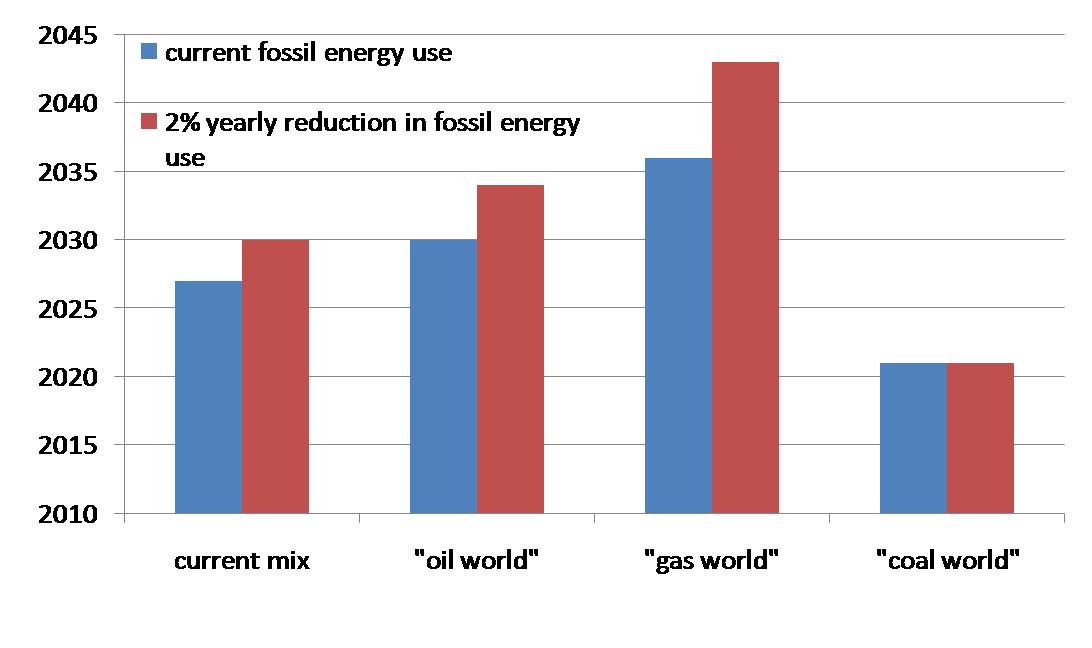There is not a long time left to come up with a technological breakthrough to get rid of CO2 emissions. The other option is crocodiles in Scandinavia if we remain on current emission trends.
Recently, there has been a lot of media attention on atmospheric CO2 concentrations reaching 400 ppm (parts per million). Apart from the fact that this is a nice round number, it does not have much significance. But it points to the fact that CO2 concentration in the atmosphere is increasing fast, and we are not that far from the 450 ppm level which is associated with an eventual 2 C° temperature increase.
There is also an interesting report from Carbontracker calculating the remaining carbon budget before we are likely to hit the 2 C° limit. It argues that the reserves of the first 200 listed coal and oil & gas companies together are beyond this limit, and if the carbon limit is not to be exceeded, part of these reserves should stay in the ground.
![Expo500[1].jpg](https://m.blog.hu/gu/gurulohordo/image/Expo500%5B1%5D.jpg) Ticking away. Source: Ecomotion
Ticking away. Source: Ecomotion
As we argued in our very first post, the 2 C° limit is not some kind of magic number – there is no guarantee that things would be OK with only 1.9 C°, and it is no sure and immediate disaster if the temperature increase is 2.1 C°. Also, there is a lot of uncertainty about the exact extent that carbon emissions increase the temperature (the fact that they increase it is fairly certain though). But let’s take the carbon budget concept for demonstration purposes, and accept Carbontracker’s number.
First, let’s find out the constant rate that we have to reduce CO2 emissions from now on to remain within the carbon budget. That rate is about 6% each year. Currently the world emits roughly 30 gigatons of CO2 a year, and according to Carbontracker, at the end of 2012 the remaining “budget” was about 500 gigatons. The 6% decline rate each year is very, very steep if we only rely on current technologies. This is why remaining within this budget seems impossible without a technological breakthrough. Given a growing world population and rising global GDP, with existing technologies even stabilizing CO2 emissions at current levels would be a real feat. And that would of course imply an increasing CO2 level in the atmosphere; we would only avoid the acceleration of this increase by stabilizing emissions at current levels.
OK, so we need to wait for a technological breakthrough. How much time do we have to come up with and deploy the carbon-free technology? In which year would we hit the carbon budget limit? On the following chart I show the approximate years, under two scenarios: (i) assuming that we stabilize the current fossil fuel use, and (ii) a 2% per annum decline (even the stabilization scenario is highly optimistic though). This disregards other greenhouse factors like methane and soot, which could change the numbers somewhat (probably overall making it worse), so only take it as a rough estimate. I also assume three other theoretical cases, when the world immediately switches purely to oil, gas or coal use, to show the relative merits of the different fuels (these numbers are more uncertain because they rely on assumptions of efficiency – I tried to be conservative and not err in the favor of gas, our favorite). This is a theoretical exercise: of course switching could not happen overnight, because you would need to throw away the current infrastructure (think of cars), and put a new one in its place.
On natural gas we would last longer - The (approximate) year of exceeding the carbon budget associated with a 2 C° temperature increase:
 Sources: own calculations, BP, Carbontracker
Sources: own calculations, BP, Carbontracker
With our current energy mix, we would hit the carbon budget in about 2027, and with energy efficiency measures/renewables/nuclear resulting in a 2% fossil fuel consumption reduction per annum, this could be extended by only 3 years. Switching completely to natural gas (which would be impossible to do in a short time) would add about 10 years.
So we do not have much time – it is very likely that the carbon budget will be exceeded, and if the current assumptions are correct, the temperature increase would also exceed 2 C°. The IEA is currently expecting 3.6 C° in its main scenario and says that current trends point to 6 C°.
6 C° would be bad news. We do not know exactly what would happen, but crocodiles were swimming in the Arctic the last time global temperatures were about 6 C° higher than in the recent past …
![439px-Eocene[1].jpg](https://m.blog.hu/gu/gurulohordo/image/439px-Eocene%5B1%5D.jpg) The new face of Scandinavian forests? Source: Wikipedia
The new face of Scandinavian forests? Source: Wikipedia
A bejegyzés trackback címe:
Kommentek:
A hozzászólások a vonatkozó jogszabályok értelmében felhasználói tartalomnak minősülnek, értük a szolgáltatás technikai üzemeltetője semmilyen felelősséget nem vállal, azokat nem ellenőrzi. Kifogás esetén forduljon a blog szerkesztőjéhez. Részletek a Felhasználási feltételekben és az adatvédelmi tájékoztatóban.




